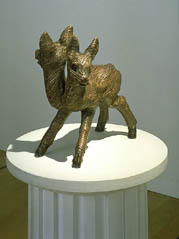
|
| Technical Details: copper
wire, epoxy, computer, amplifier, 120x50x50cm |
|
A few years ago, Kees Aafjes presented us with a curious interactive object, entitled Spanish Fly. When you touched this large fly, made of electronics, copper wire and polyester, much to your surprise it responded enthusiastically: "Caramba!,", "mas, por favor", "me gusta", "delicioso, hmm, ohh", etc. As if this cold object became all warm and exited by your touch and yearningly begged for more. An exceptional experience, to say the least.
And now there is Foundling, a small deer made of copper wire. Or in fact it is not one, but two deer, because the body has two heads, each with a character of its own. This mysterious sculpture displayed on a pedestal has a long history:
Amphion and Zethos, the sons of Zeus, were twin brothers. They were different in all respects: Zethos favoured the hunt, the contest and physical achievement, while Amphion preferred the Muses and the fine arts. The only thing they had in common was their rejected love for Antiope, the daughter of Nykteus, King of Thebes. Together, they took on the shape of a satyr and raped her. Antiope became pregnant and, fearing the wrath of her father, she fled from Thebes. Overwhelmed by grief, King Nykteus took his own life, first having ordered his brother, Lykos, to punish Antiope. Lykos came upon her at the court of King Sikyon, and brought her back to Thebes. During the journey home, she gave birth to Siamese twins. Lykos gave orders for the twins to be put to death. Antiope hid the twins in the forest and begged Zeus to have mercy on his grandchildren. Zeus did not wish Lykos to have them put to death after all, and had them turned into stone, only to be temporarily brought back to life by being touched...
And now these Siamese twins, as foundlings and with a spell cast over them by Divine verdict, are here, awaiting the touch which can reawaken them. And certainly, when you stroke them, they show themselves to be full of life and enthusiastically beg for more caresses, for more attention. However, despite their predicament, they are far from like-minded in their behaviour: they mock each other and fight for your attention. Apparently they are 'a chip off the old block'. Despairingly, you try to fulfil their wishes and begin to wonder whether you should take sides...
As with Spanish Fly, Foundling is an ingenious and playful representation of our problematic relationship with (art) objects and machines. We cherish our objects and even endow our machines, such as computers, answering machines and cigarette dispensers, with a voice. Our way of dealing with electronic apparatus is almost fetishistic. Yet we pretend to be the masters over these things. When it comes to works of art, we put them on a safe and distant pedestal. Please do not touch. The message of art should above all be taken symbolically.
With Foundling, Aafjes, mischievously and somewhat ironically, reverses the various roles, by challenging us to abandon our conventional code of behaviour: he lures us into letting an object take over, and entices us into embarking upon a physical relationship with a work of art, which we not only embrace mentally, but also caress physically.
Jorinde Seijdel
|
|
